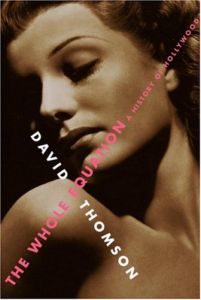Taking his title from a line in The Last Tycoon, Thomson sets out to explore the American movie business in all its complexity, all its component parts, from the invention of film until the present day. What is "the whole equation"? In the author's words: "It embraces the majesty, the business statistics and millions of us being moved, the art and the awfulness. It accommodates the artistic careers, the lives of the pirates, the ebb and flow of business, the sociological impact — in short, the wonder in the dark, the calculation in the offices, and the staggering impact on America of moving pictures. Which is to say, also, the thunderous artillery of America unleashed on all the world."
And to be sure, it's essential to follow the money, which Thomson always does, making clear that the urge to tell the stories that are movies is inseparable from the urge to make money, and that the movies redefined greed — there was just so much money to be made. We start when D.W. Griffith yields final say on his films to a movie executive, making the essential point that it's always the studio that owns the work. We see Chaplin, who understands the whole equation, rising and then losing his way when he, the artist, not the mogul, has the final say — another essential point. We learn how Louis B. Mayer mastered the whole equation, and dominated the golden age of film, understanding both how to make a star and the dreamlike state of moviegoers, trying to escape reality.
